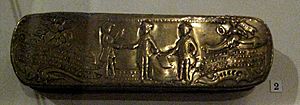Miracle of the House of Brandenburg facts for kids

The Miracle of the House of Brandenburg is a name given by Frederick II of Prussia to two surprising events during the Seven Years' War. These events helped Prussia avoid defeat when things looked very bad. The first "miracle" happened in 1759 when Russia and Austria won a big battle against Frederick but didn't follow up their victory. The second "miracle" happened in 1762 when Russia suddenly changed sides in the war, which saved Prussia from likely defeat.
Contents
Prussia's Close Call in 1759
After the Battle of Kunersdorf on August 12, 1759, Frederick II thought Prussia was surely going to lose the war. He wrote that it was "a cruel defeat!" and that he believed "everything is lost." Prussia had lost 19,000 soldiers in that battle, leaving only 18,000.
Just a few days later, on August 16, Frederick wrote that if the Russian army crossed the Oder river and marched towards Berlin, the capital of Prussia, they would fight. He said they would fight "more in order to die beneath the walls of our own city than through any hope of beating them."
The Russian army, led by Field Marshal Saltykov, did cross the Oder that same day. The Austrian army, led by Field Marshal Laudon, had already crossed the day before. Another Austrian army, led by Field Marshal Daun, was also marching north. All three enemy armies planned to march on Berlin.
The Enemy's Hesitation
Frederick gathered 33,000 men to defend Berlin. He thought the enemy forces totaled about 90,000 soldiers. What happened next, Frederick called the "Miracle of the House of Brandenburg."
The Austrian and Russian armies did not quickly attack Berlin. They seemed unwilling to push their victory further. By September, they started to pull their forces back. Both armies had also lost many soldiers at Kunersdorf (about 16,000 men). They were also worried that their supply lines were stretched too far by marching so deep into Prussia.
Frederick's brother, Prince Henry, had an army that was not involved in the Kunersdorf battle. This army still posed a threat to the Austrians and Russians. Seeing these events unfold, Frederick regained his confidence.
Russia Changes Sides in 1762
By December 1761, after five years of fighting, Prussia's situation looked very bad. Even though Frederick had won some battles, the overall war was going poorly. On December 10, Frederick wrote about how difficult things were. He mentioned that the Austrians and Russians controlled many key areas. He also noted that Prussia's fortresses and even Berlin were "at the mercy of the Russians."
During the war, Prussia had lost many important people. They lost 120 generals, 1,500 officers, and over 100,000 soldiers. Most Prussians wanted peace. Frederick was trying to get the Ottoman Empire to join the war on his side, but he wasn't successful.
A New Tsar Saves Prussia
Then, in January 1762, Frederick received amazing news. Empress Elizabeth of Russia had died on January 5. Frederick wrote about her death, calling her "the Messalina of the North" and saying, "The Beast is dead."
Elizabeth's nephew, Peter, became the new ruler of Russia. Peter was a big admirer of Frederick the Great. He quickly changed Russia's war policy. He began to negotiate for peace with Prussia. An agreement to stop fighting was made in March, and a peace and friendship treaty was signed on May 15. This sudden change by Russia saved Prussia from what seemed like certain defeat.
Sources
- Fraser, David (2000). [Miracle of the House of Brandenburg at Google Books Frederick the Great: King of Prussia]. London: Allen Lane. ISBN 0-7139-9377-4. Miracle of the House of Brandenburg at Google Books.
- Weigley, Russell F. (2004). [Miracle of the House of Brandenburg at Google Books "The Miracle of the House of Brandenburg"]. The Age of Battles: The Quest for Decisive Warfare from Breitenfeld to Waterloo. Indiana University Press. ISBN 0-253-21707-5. Miracle of the House of Brandenburg at Google Books.
 | May Edward Chinn |
 | Rebecca Cole |
 | Alexa Canady |
 | Dorothy Lavinia Brown |

